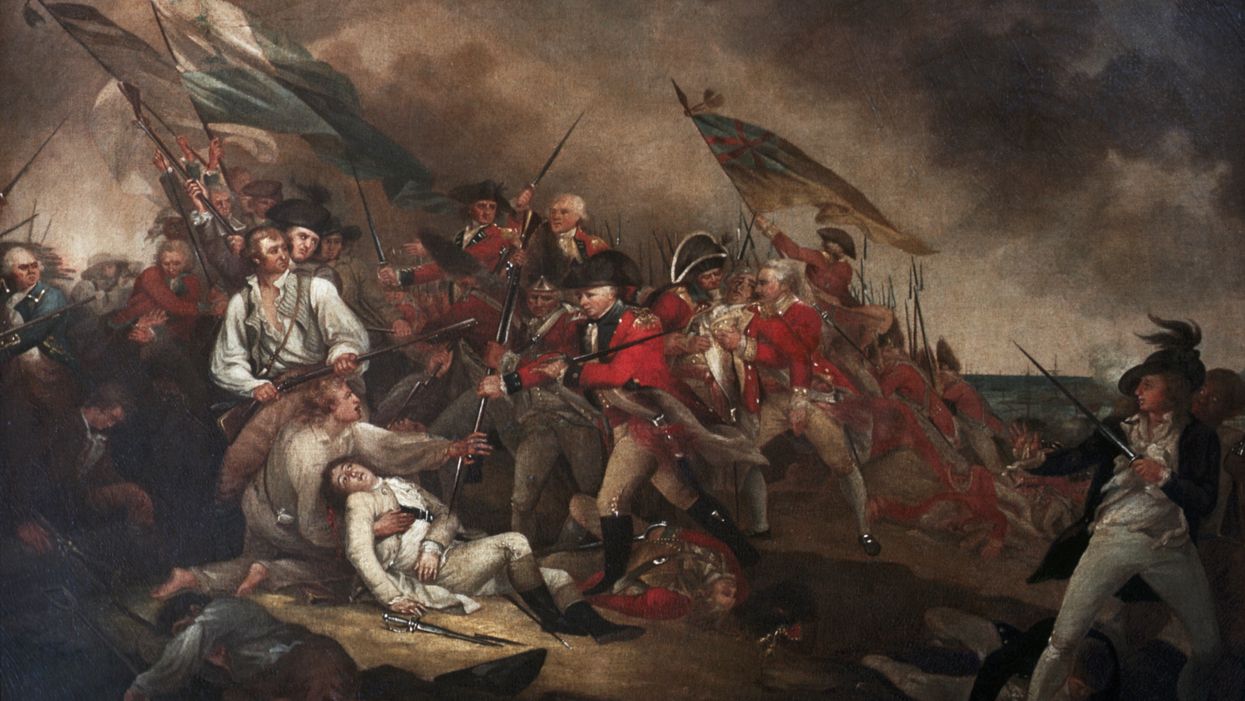
The death of Gen. Warren at the Battle of Bunker Hill (Photo by Barney Burstein/Corbis/VCG via Getty Images)

Editor's note: In order to allow our staff to enjoy the 4th of July holiday with their families, TheBlaze will be running a series of articles today commemorating the Revolutionary War, which won America her freedom. God bless America, and all of you.
BOSTON (JUNE 17, 1775) — British regulars captured a key strategic point in the ongoing siege of Boston today, but suffered staggering losses in the process, leading some to question the leadership of Gens. Thomas Gage and William Howe, as well as Britain's assumed military supremacy in the American colonies.
Last night, some 1,200 American troops, operating under the command of Col. William Prescott, stealthily snuck into Charlestown and dug in on both Bunker Hill and adjacent Breed's Hill. Sources in the American army indicate that Prescott may have disobeyed orders from Gen. Artemis Ward, who ordered Prescott to occupy only Bunker Hill, which would present a fortified and easily defensible position from which to continue the siege. However, for reasons yet unclear, Prescott also undertook to fortify Breed's Hill farther to the southeast.
From Breed's Hill, American artillery was suddenly within range of both the Mystic River and also Boston Harbor, which meant that the American presence there presented an untenable threat to the British forces' supply lines. Accordingly, Gen. Gage promptly ordered that Breed's Hill be retaken at all costs and that the American forces be driven from Charlestown neck. Gen. Howe was given a force of about 2,300 British regulars with orders to eliminate the American threat.
Howe marched his men through the streets of Boston to the Charles River, where they boarded barges to carry them across. They reached the site of their attack point around 3 p.m., accompanied by a naval bombardment from the Royal Navy, and began to march in formation the 2,000 yards up the hill to meet his waiting foe.
The American forces, which had been reinforced on orders from the reportedly furious Gen. Ward, were still hazardously low on ammunition. As such, other than isolated sniper fire, the Americans held their fire until British soldiers were less than 50 yards away, at which point they unleashed a murderous fusillade of bullets into the redcoats' ranks. The close-range fire was so effective that Howe was forced to halt his advance and spend the better part of half an hour regrouping his men for a second charge up the hill.
Again, Americans held fire, this time until the British were even closer, and the results the second time were no less devastating. One British soldier described this second volley of fire as "a continual sheet of lightning." Again General Howe was forced to fall back.
Reports indicate that at this point, Howe's men began to beg with him not to attempt a third assault on the fortified position. Every member of Howe's staff was dead or wounded at this point, and British soldiers have accused the Americans of deliberately targeting officers during the charge. Howe, though, was insistent that the hill must be taken, so he summoned reinforcements for a third charge.
According to reports, the American ammunition situation was so dire at this point that Col. Prescott ordered his men to hold their fire "until you can see the whites of their eyes." This time, the British were allowed to get within 15 yards of the summit before the Americans opened fire. Again, the results were murderous, and British regulars gained the Hill only when Americans ran out of ammunition and were forced to flee. Many were bayoneted or shot by the British out of hand as they fled.
Ultimately, the British removed the American threat from Breed's Hill, but paid heavily for their strategic victory. According to official British reports, 226 British regulars died and an additional 928 were wounded. Americans, on the other hand, suffered 160 dead and 271 wounded in this day's fighting.
Although Gen. Gage issued a proclamation of victory, he also was heard to exclaim to his staff that the Americans "shew a spirit and conduct against us, they never shewed against the French," reflecting his country's poor opinion of American battle prowess in the French-Indian War.